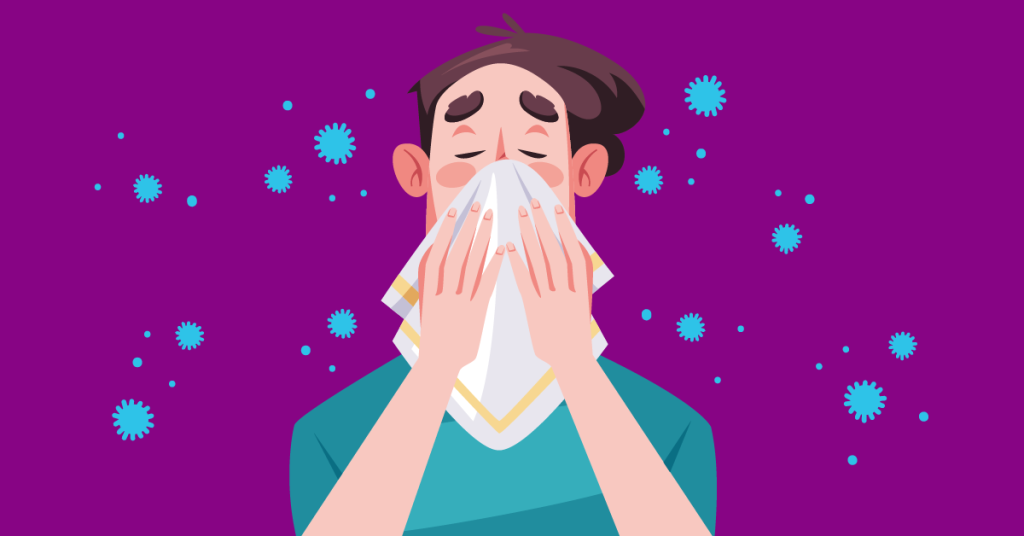Are your persistent sniffles and sneezes more than just allergies? If you’re no stranger to seasonal or year-round allergy symptoms—the sneezing, congestion, and itchy eyes—you might also be experiencing a more serious complication: a sinus infection. Understanding the link between your allergies and sinuses is the first step toward finding lasting relief and healthier breathing.
How allergies set the stage for sinus infections
Allergies occur when your immune system overreacts to otherwise harmless substances like pollen, mold, dust mites, or pet dander. Your body overreacts, initiating an inflammatory chain reaction. Histamine floods your system, leading to inflammation in your nasal passages.
This inflammation can lead to several problems that directly contribute to sinus infections:
- Swollen nasal tissues: The lining of your nose and sinuses becomes inflamed and swollen, narrowing the passages.
- Blocked mucus drainage: The swelling obstructs the tiny openings (ostia) that allow your sinuses to drain naturally.
- Trapped mucus: Mucus, normally thin and flowing, becomes trapped inside your sinus cavities, creating a stagnant environment.
When mucus builds up and is unable to drain, it creates a warm, moist environment—the perfect breeding ground for bacteria, viruses, or fungi to multiply. This leads to a infection, commonly known as sinusitis (a sinus infection).
In addition, chronic allergies can weaken the immune system, making it more challenging for the body to fight off infections, including sinus infections.
The difference between allergies and sinus infections
While allergy symptoms and sinus infection symptoms often overlap, distinguishing between them is crucial for effective treatment.
| Common allergy symptoms | Common sinus infection symptoms |
|---|---|
| Sneezing: Often occurs in bursts. | Persistent facial pain or pressure: Especially around the cheeks, eyes, forehead, and teeth. Pain often worsens when bending over. |
| Clear, runny nose: Nasal discharge is typically thin and clear. | Thick, discolored nasal discharge: Typically yellow, green, or brown. |
| Nasal congestion or stuffy nose: Can be intermittent or persistent. | Prolonged nasal congestion: Often more severe and persistent than allergy congestion. |
| Itchy eyes, nose, or throat: A hallmark of allergic reactions. | Reduced or loss of smell and taste: Due to significant nasal blockage. |
| Watery eyes: Often accompany eye itchiness. | Fever or general fatigue: More common with bacterial or viral infections. |
| Trigger-related: Symptoms tend to flare up with exposure to specific allergens (pollen during certain seasons, pet dander when around animals). | Symptoms lasting more than 10 days: Or symptoms that initially improve but then worsen. |
| No fever: Allergies do not cause a fev | Bad breath: Can be caused by post-nasal drip from infected sinuses. |
Remember: Allergies themselves are not infections. However, when left unmanaged, they can significantly increase your vulnerability to recurring and chronic sinus issues. Identifying whether your symptoms stem from allergies or a sinus infection is an important first step to determine the most effective treatment.
“We know it’s tough when allergies fuel constant sinus infections. At Minnesota ENT, we’ll pinpoint your allergy triggers and develop a personalized treatment plan—possibly including immunotherapy—for lasting relief. And if allergies aren’t the source of your chronic sinus infections, we’ll explore other effective solutions to help you breathe easier and feel your best.“
– Bradley Johnson, DO, Minnesota ENT physician
Proactive steps to prevent allergy-related sinus infections
Taking control of your allergies is the first line of defense against developing a sinus infection. Here are proactive steps you can take:
- Effective allergy management
- Over-the-counter (OTC) medications: Antihistamines, decongestants and nasal steroid sprays can help reduce inflammation and congestion.
- Prescription medications: Your provider may recommend stronger antihistamines or other medications if OTC options aren’t sufficient.
- Allergy drops or shots (immunotherapy): For severe or persistent allergies that don’t respond well to other treatments, immunotherapy, whether through allergy drops or allergy shots, can be a transformative option. This gradual process trains your immune system to become desensitized to specific allergens, offering long-term relief.
- Diligent allergen avoidance through lifestyle adaptations
- Pollen: Keep windows and doors closed during high pollen seasons. Use air conditioning with a HEPA filter.
- Dust mites: Use allergen-proof covers on mattresses and pillows. Wash bedding weekly in hot water (>130∘F).
- Pet dander: Bathe pets frequently, keep them out of bedrooms, and use HEPA air purifiers.
- Mold: Address any leaks or dampness in your home. Use a dehumidifier in basements or bathrooms.
- Regular nasal irrigation
Using a nasal rinse (like a neti pot or saline spray) with sterile or distilled water can be quite effective. It helps to flush out allergens, irritants, and excess mucus, promoting clearer nasal passages and improved drainage. - Stay well-hydrated
Drinking plenty of water throughout the day helps thin mucus, making it easier for your sinuses to drain and preventing stagnation. - Maintain good indoor air quality
Use a high-efficiency particulate air (HEPA) filter in your HVAC system and consider standalone HEPA air purifiers for rooms where you spend a lot of time.
Minnesota ENT can help
If your allergy symptoms consistently lead to frequent, prolonged, or severe sinus infections, it’s absolutely time to make an appointment with an ENT specialist. Early detection and appropriate treatment are game-changers, leading to less pain, fewer complications, and a reduction in recurring infections.
At Minnesota ENT, we offer comprehensive, expert care for both allergies and sinus conditions. Whether you need thorough allergy testing to identify your specific triggers, discuss various treatment options, or explore surgical solutions for chronic sinusitis, we are dedicated to helping you breathe easier and achieve lasting relief.
Don’t let allergies dictate your sinus health. Take control—schedule an appointment with us today.
- Call us at 763-233-5755
- Text us at 763-265-6087
- Schedule with our new one-click messaging (click “Message us” in the lower right corner of your screen.)
Appointments are available in Golden Valley, Maple Grove and Robbinsdale.

